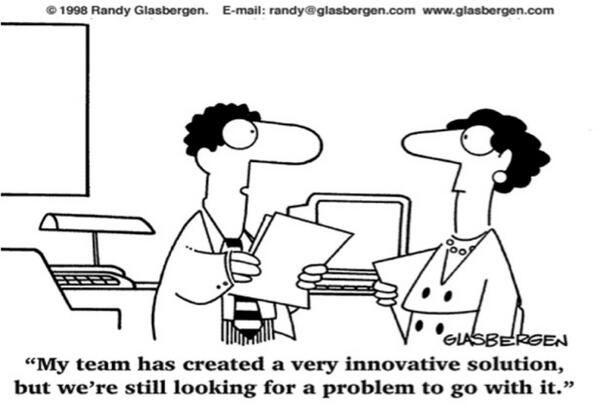I started working in the blockchain field in late 2015 after a few years of researching and analysing Israel’s high-tech, venture capital, and private equity industry. I have listened to countless presentations from experts offering advice to startups on how to succeed. I’ve also heard an untold number of startup pitches, spoken with founders from around the world, and read loads of white papers. I’ve learned a lot and continue to learn every day from these experiences.
There’s a HUGE mistake that gets made by too many startups. It’s a mistake that’s overlooked far more than it should be, and it just so happens to be one of the key reasons why startups fail.
It’s not unique to blockchain and crypto startups, but it seems to be more prevalent. I’m talking about the need to pinpoint a SPECIFIC business challenge first, then focus on the solution second.
It sounds so obvious and is quite astonishing when you think about it. Yet many entrepreneurs dive headfirst into creating a blockchain or crypto-based solution without knowing if it solves a specific problem or has any commercial viability.

This backward-thinking business logic is a result of two main factors. First, startups will be startups. These are, by definition, young companies with little experience. They are often focused on the exciting parts of the startup journey, on the glory, and the bigger picture, that the basics and finer details fall by the wayside.
A decade of blockchain and crypto hype has also contributed. Hoards of investors crippled with FOMO (Fear of Missing Out) throwing millions of dollars at anything with the word blockchain sent a strong message to startups to use blockchain technology at all costs and think about the details later. Investors have been one of the worst enablers of the “solution first, business challenge second” backward thinking logic.
Things are a little better today after the crypto winter of 2018. More entrepreneurs and investors are now looking at blockchain technology and its real-world applications with greater scrutiny. But the old mindset persists, especially among newbies, and it’s for this reason that I decided to come up with an approach. It doesn’t guarantee success, but it can serve as an anchor to keep founders from veering off and crashing into the rocks.
The MAP Approach
MAP stands for Measured, Agnostic, and Pragmatic. Its goal is to help startups think before diving headfirst into building a solution that nobody really wants or needs.
Measured
Being measured is all about checking the overexcitement and focusing on the details. It’s about moving a little slower, making more considered decisions rather than rash ones, and being patient rather than hasty. Being measured starts with finding and understanding a business or consumer challenge. It requires lots of research that involves going out and speaking to people or companies who are affected by the problem you’ve identified. It’s about digging in to see what pain points exist, whether there’s a real demand for a solution, and if a large enough market exists. Key questions to ask include:
- What problem are you solving?
- Are solutions already available? What can you learn from them?
- What’s the size of the market?
- What funds do I need to start?
Agnostic
It can be tempting to use technologies that are hyped like Blockchain and AI, but deciding on technology from the outset can lead to disaster. Startups need to be technology agnostic when building a product or service, which means putting any love affair with a technology to the side so that it’s possible to look at the benefits and drawbacks of other technologies objectively. To ignore the existence of other, more mature technological solutions which have proven themselves ready for use, and are easier to work with is to put your venture on a fast track to failure. The type of technology should only be considered on its merits to solving the specific business or consumer challenge you have identified.
Bottom line. The technology you choose should not dictate how to solve a problem, rather, the problem should be driving you toward the technology you need. Key questions to ask include:
- What technologies have the potential to solve the problem you have identified?
- What are the pros & cons of using each technology? How do they compare? Which one adds the most value?
- Are there any mature technologies ready for use? Why don’t you use them?
Pragmatic
Startups must take a practical approach when assessing the viability of development and real-world implementation of a solution. Put simply, it’s vital to make sure that the solution you have chosen can actually get built and implemented. (Implementation is obviously of greater concern for b2b startups)
Let’s take a blockchain-based solution as an example. It may well be a great choice to solve the problem you have identified, but that’s not enough, there are other issues to consider. Taking a pragmatic approach means looking at the technology’s limitations in terms of development and real-world implementation.
Blockchain technology has several limitations like scalability, limited programming ecosystems. How will these impact the viability of your solution?
There are also difficulties involved with integration into legacy systems and privacy issues as well. What’s more, deploying blockchain technology comes with a raft of other challenges from high set up costs and lagging regulations to difficulties in the recruitment of talented blockchain developers, which are expensive and hard to find.
The bottom line is that the technological solution you choose can’t only solve the problem you have identified. It must be able to be developed and implemented without too much friction. Key questions to ask include:
- What foreseeable development challenges could arise?
- How much will the solution cost to develop?
- Do you have the knowledge & skills to develop the solution? If not, how will you obtain them?
- What difficulties could arise during implementation? Can they be mitigated or overcome? How long will implementation take?




